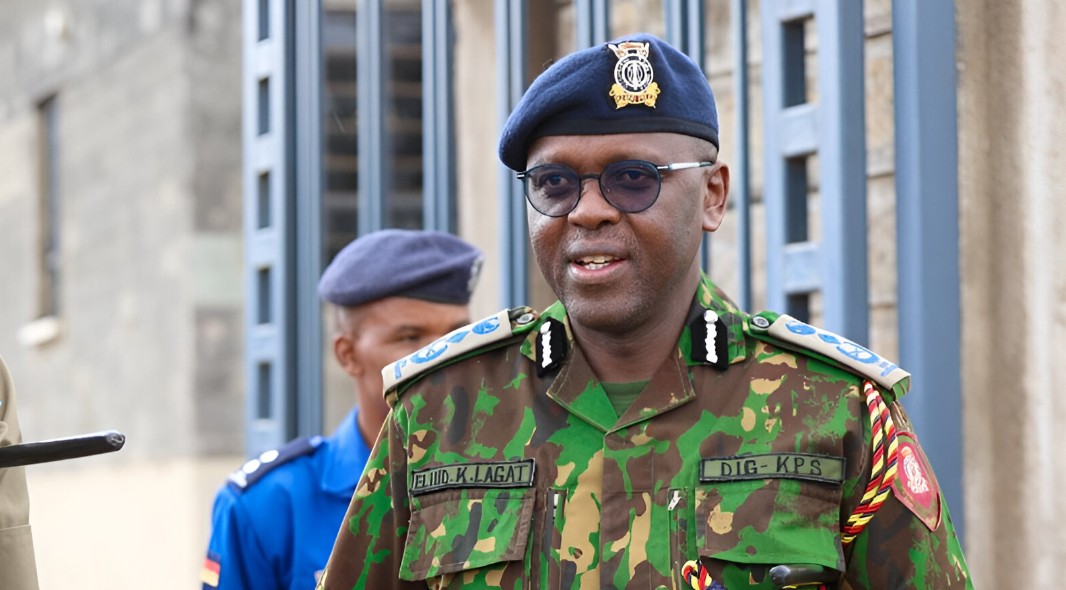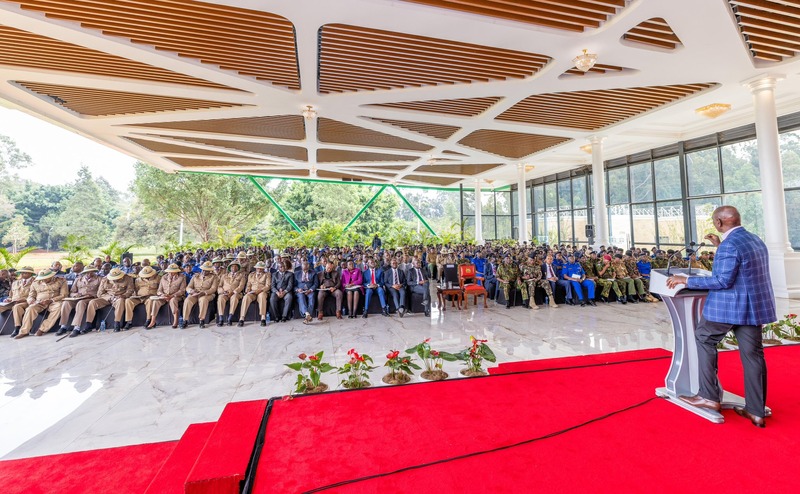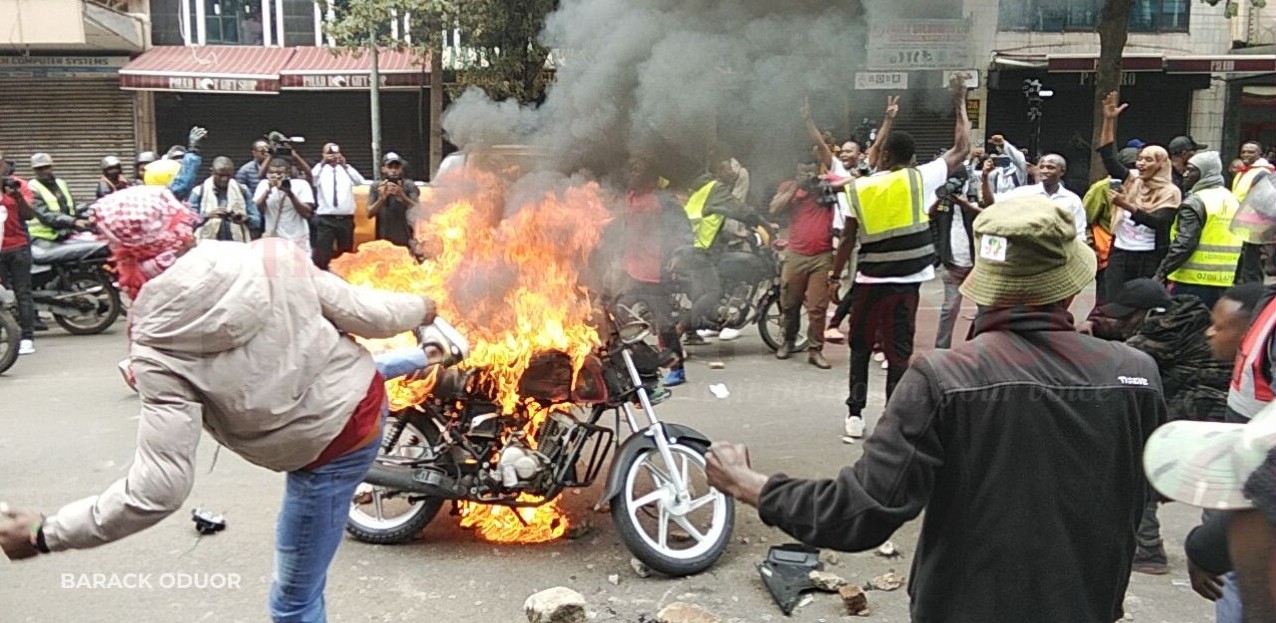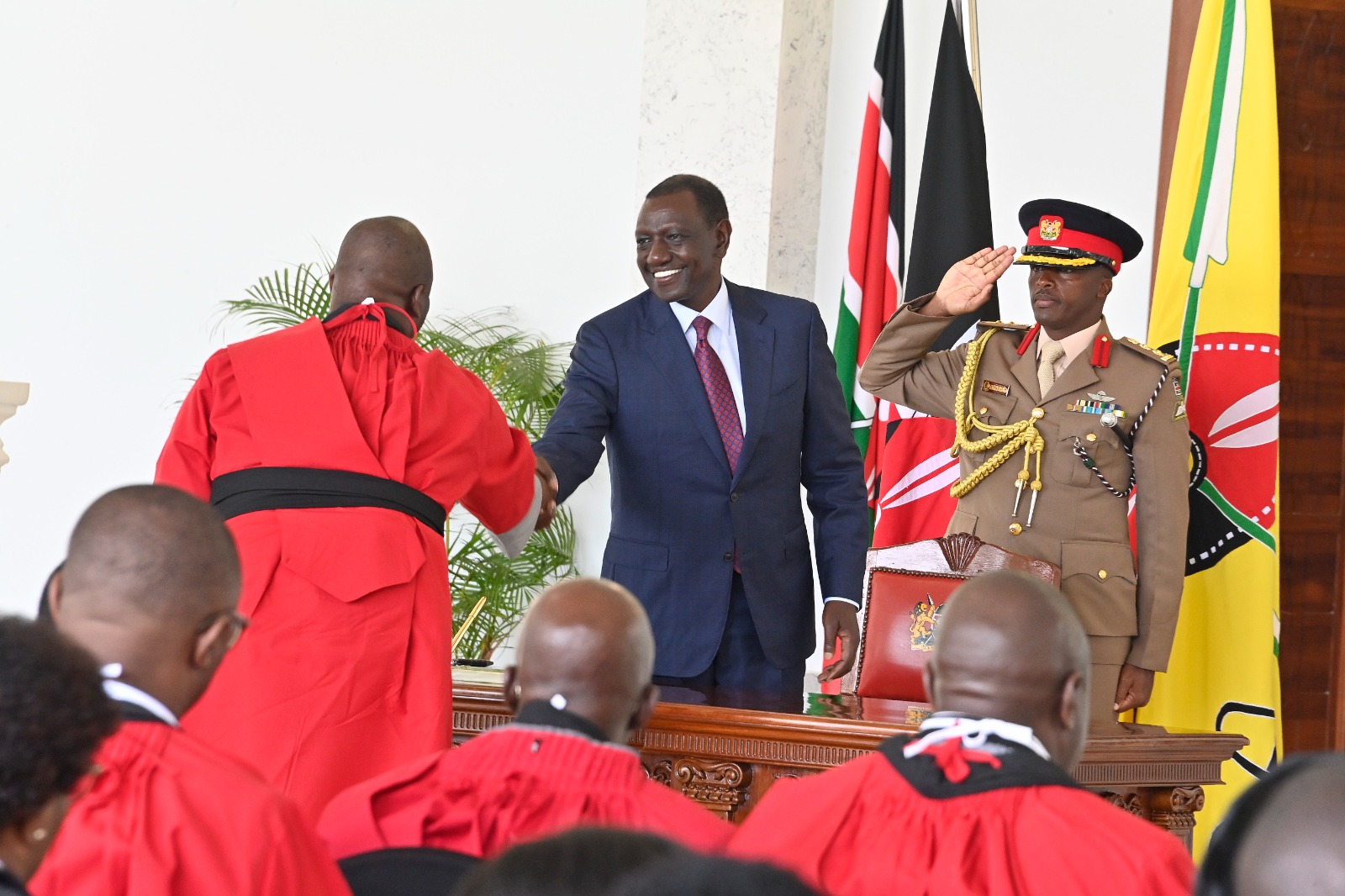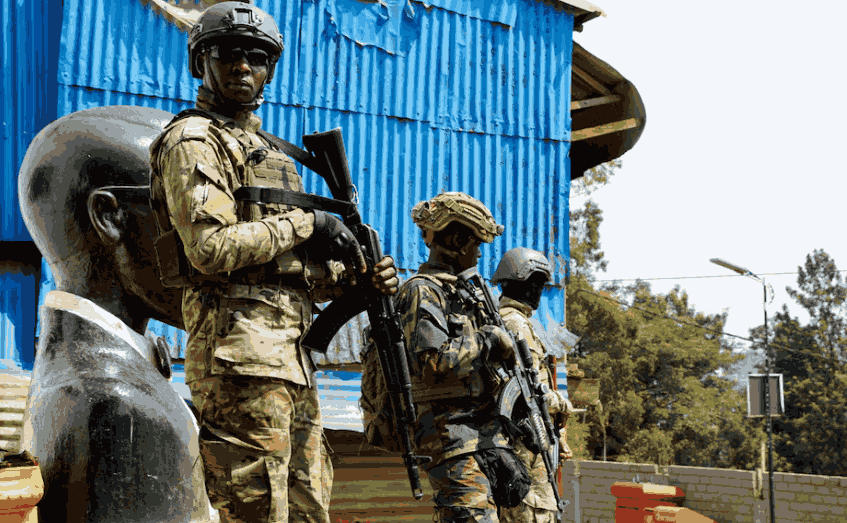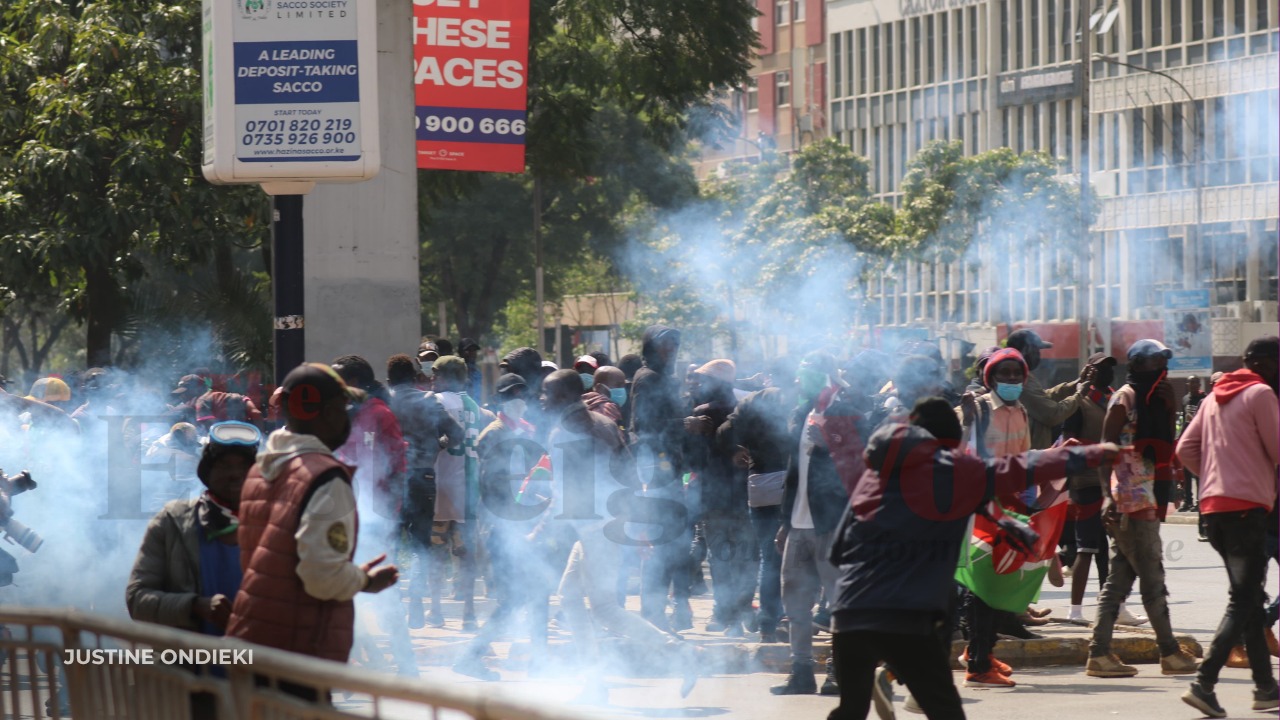Relative peace returns to North Rift two years after launch of Operation Maliza Uhalifu
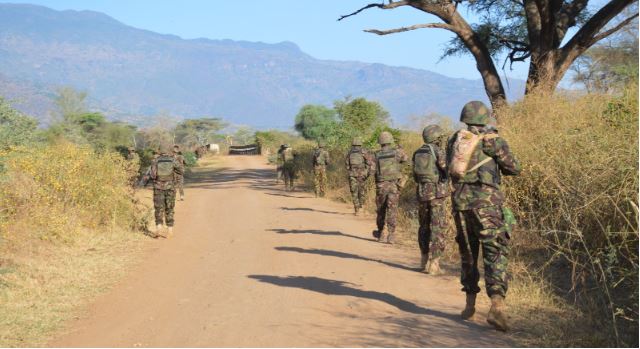
Despite the gains made, the authorities note that a number of firearms remain in the wrong hands in the region.
When President William Ruto launched Operation Maliza Uhalifu (OMU) North Rift two years ago, the plan was to kick off a journey towards ending cattle rustling and banditry that had lingered in the region for decades, leaving a large section of the region unstable, ungovernable and undeveloped.
The operation began with mapping out of hot spots along the conflict belts that would act as the areas of focus, singled out areas within and around the Suguta Valley, Kerio Valley, Malaso escarpment towards Emaya and the border towns and areas like Loruk, and Kapedo where the National Police Service, assisted by the Kenya Defence Forces (KDF) then flushed out bandits, arrested some – including a ring leader who died in custody – as more illegal arms were recovered.
More To Read
- Four bandits killed, six AK-47 rifles recovered in security raid in Meru County
- 25 rogue police reservists arrested, sacked in banditry crackdown in Kerio Valley
- Security agencies recover 106 cattle from banditry incident that left herder injured in Turkana
- Murkomen: Government to streamline command structure of police reservists, improve pay
- New security operations base unveiled in Laikipia as state steps up fight against banditry
- Worry over security situation in Rift Valley as two chiefs killed in bandit attacks
On its part, KDF bolstered police efforts further by setting up 11 Forward Operating Bases (FOBs) in the region each located along major conflict belts to ensure timely response to complex security demands.
About six months in, the region started recording gains as the National Police Service-led operation focused on kinetic activities that flushed out bandits from their hideouts in caves, hills, and forests largely weakening their defence positions and capabilities, igniting hope that the second-largest threat to national security can be dealt with conclusively.
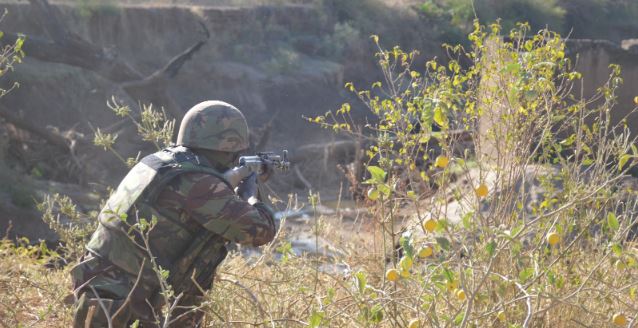 The North Rift region has moved from incessant sounds of gunshots by bandits and cattle rustlers to a state of relative peace. (Photo: Mary Wambui)
The North Rift region has moved from incessant sounds of gunshots by bandits and cattle rustlers to a state of relative peace. (Photo: Mary Wambui)
However early last year, the gains were shortly disrupted by several spontaneous attacks that made a mockery of the operation that was, however, short-lived with the State of National Security Report tabled by President William Ruto in parliament in December last year and covering the period ending August 2024 noting that interventions made had at the time resulted in significant decrease in cattle rustling cases in Baringo, Turkana, Samburu, Elgeyo Marakwet, West Pokot, Laikipia, Isiolo and Meru counties all of which were gazette as disturbed and dangerous as OMU kicked off in the previous year.
"There was a record decrease from 63,054 herds of cattle between September 2022 and August 2023 to 22, 668 herds of cattle stolen from September 2023 to August 2024. 10,173 livestock were recovered during the period under review," the report notes.
Baringo County Commissioner Stephen Sangolo noted that the few thefts and deaths that occurred last year prompted the multiagency team back to the drawing board after which calm was restored allowing the resumption of socio-economic activities and learning.
"We have had a calm period over the last almost one year now, especially on banditry issues, the last incident was one which we dealt with and this has been possible because of the multiagency approach that we have been having with all national government security officers being supported by our KDF officers," he notes.
Today, the region has moved from incessant sounds of gunshots by bandits and cattle rustlers to a state of relative peace that is helping communities embark on rebuilding their normal lives as schools in areas considered hotspots are guarded by at least five armed officers.
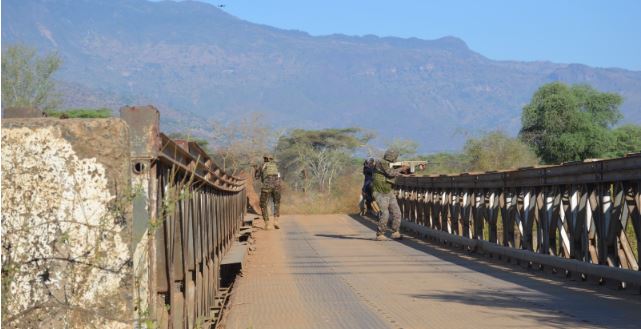 Multi-agency patrols have kept the bandits away and helped calm those that have braved themselves back. (Photo: Mary Wambui)
Multi-agency patrols have kept the bandits away and helped calm those that have braved themselves back. (Photo: Mary Wambui)
"We are not yet where we are supposed to be but the few bits here and there we are working on them. The aspect of banditry in Baringo has changed because we have come from where it was from the community and now it has gone to criminals and we are looking for the few criminals that are now engaging in these criminal activities," Sangolo adds.
Brigadier Stephen Huria, the KDF commander in charge of OMU, says the approach to the multi-agency operation is different compared to previous operations in the sense that they are implementing a strategy that will ensure enduring peace in the North Rift.
Consequently, he adds the operation has embarked on socio-economic development of the region after attaining that relative peace through renovations of schools that were destroyed in past attacks, securing markets and main supply routes to ensure supplies are moved with ease as trading activities resume.
This is alongside KDF support to the police in ensuring that bandits don't attack and cattle rustlers don't conduct raids and are eliminated completely.
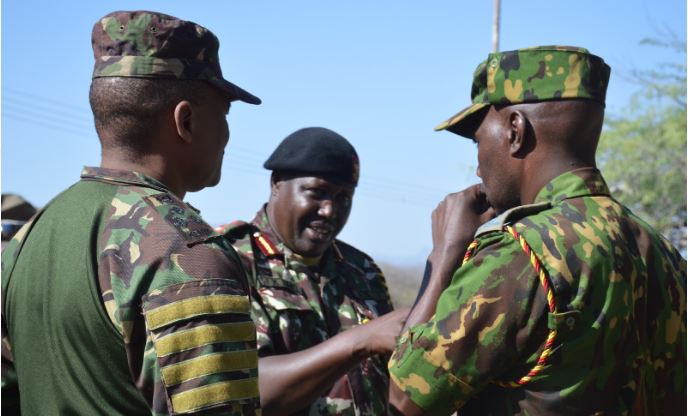 Brigadier Stephen Huria (centre), the KDF commander in charge of Operation Maliza Uhalifu confers with ASTU Commandant AIG Joseph Limo and Baringo County Commander Julius Kiragu at Loruk Police Station on February 21, 2025. (Photo: Mary Wambui)
Brigadier Stephen Huria (centre), the KDF commander in charge of Operation Maliza Uhalifu confers with ASTU Commandant AIG Joseph Limo and Baringo County Commander Julius Kiragu at Loruk Police Station on February 21, 2025. (Photo: Mary Wambui)
"By so doing we have deployed our forces in all the six counties, especially the hotspots, so that we have relative calm," the brigadier explained.
Anti-Livestock Theft Unit (ASTU) Commandant Joseph Limo, the coordinator of the overall operation, says guns have been silenced in the North Rift as the area continues to record a relative state of calm.
"In terms of recoveries, 90 per cent of the animals that have been stolen have been recovered and we have recovered a substantial number of assorted weapons and ammunition. We also want to restore confidence among members of the public and tell them that there are enough police officers around, our operations are intelligence-led; we are not reactive, we are proactive," he noted.
Though some of the far-flung areas that took a while to restore peace are yet to record full return of people back to their villages, multi-agency patrols have kept the bandits away and helped calm those that have braved themselves back.
Such include the area along Kolowa-Tot road near Kerio River in Elgeyo Marakwet where last month two women who were coming from Nginyang' market were killed aboard a boda boda on their way home. Security agencies have since distanced the incident from banditry and cattle rustling, terming it a murder crime by some known criminals in the area.
"We are just remaining with a few criminal elements conducting criminal activities, not banditry as it were in the beginning," Lt. Col Celestine Ismael Papa, the commanding officer of the KDF operations in OMU says.
He spoke to The Eastleigh Voice on Tuesday last week during a visit to the region to assess the state of security.
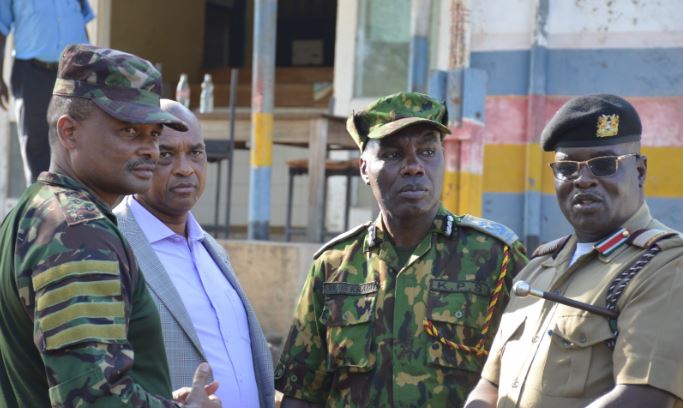 From Left: Brigadier Stephen Huria confers with Baringo County Police Commander Julius Kiragu and Baringo County Commissioner Stephen Sangolo at Loruk Police Station on February 21, 2025. (Photo: Mary Wambui)
From Left: Brigadier Stephen Huria confers with Baringo County Police Commander Julius Kiragu and Baringo County Commissioner Stephen Sangolo at Loruk Police Station on February 21, 2025. (Photo: Mary Wambui)
From mere observation, one can tell that normalcy has gradually resumed as areas that could hardly be accessed two years ago are now accessible, intercommunal markets have resumed operations, and most of the schools that had yet to be reopened are now progressing with their learning. A few cases of schools yet to open have been solved by accommodating learners in neighbouring schools.
According to Lt Col Papa, the current state of peace has been sustained through dominant patrols supported by key leadership engagement whereby elders have been brought together to bring out solutions to issues causing conflict.
As such grassroots grazing and peace committees, as well as livestock market association committees have been established to check on recurring conflict patterns such as boundary and grazing disputes and guard against the sale of stolen livestock in local markets.
While initially the operation kicked off with mainly kinetic operations, the current phase has embraced softer approaches to win the war in the long term.
Baringo County Police Commander Julius Kiragu confirmed that over 600 National Police Reservists have been deployed within Baringo North, Baringo South, Tiaty East and Tiaty West to ensure a sustained state of calm.
Here, the reservists, being from host communities and known by communities, assist the police in enforcement of laws and regulations, in the recovery of stolen livestock and in accessing places where the police cannot reach.
"The way the community perceives the National Police Officers is different from how they perceive the NPR, their local kinsmen. If you want to arrest somebody, you will be more respected when in the company of an NPR," explains Mr Robert Ndambiri the Tiaty West Sub-County police commander.
Despite the gains made, the authorities note that a number of firearms remain in the wrong hands in the region.
"Knowing exactly where they source their firearms is a bit difficult because we are surrounded by neighbours that are in conflict like South Sudan, Somalia and parts of Uganda," Kiragu said.
Top Stories Today
